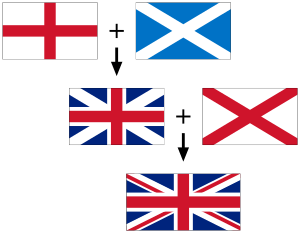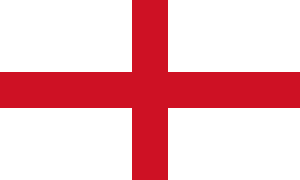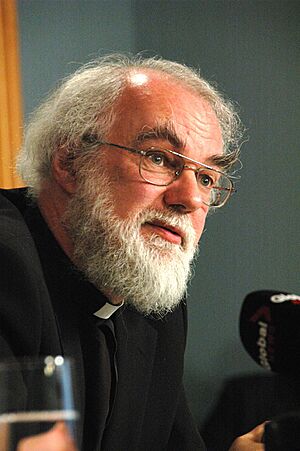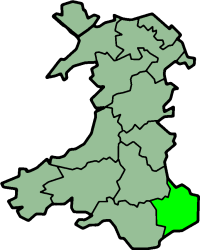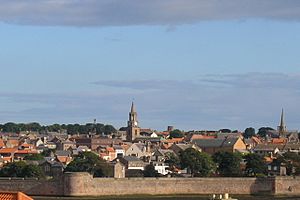Politics of England facts for kids
The politics of England is a big part of how the United Kingdom is run. England has more people than all the other parts of the UK (Scotland, Wales, and Northern Ireland) put together. It's also the largest in size and has the biggest economy.
London, the capital of England, is also the capital of the whole UK. The English language is the main language spoken across the UK.
Some places like the Isle of Man, Jersey, and Guernsey are linked to England for some things. But they have their own parliaments and are not part of the UK or England.
Before 1707, England had its own monarch (king or queen) and its own Parliament of England. But after the Union in 1707, England no longer had its own separate government.
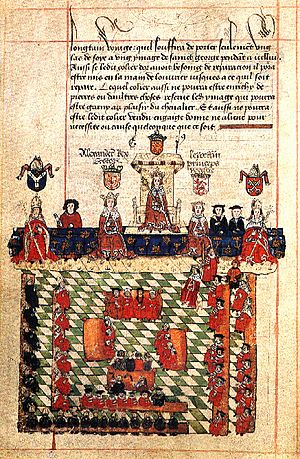
Contents
History of English Politics
Early English Government
The idea of the English Parliament started a very long time ago with the Anglo-Saxons. They had a council called the Witenagemot. This council helped the king make important decisions.
In 1066, William the Conqueror brought a new system called feudalism. Kings would ask for advice from important landowners and church leaders.
In 1215, King John signed the Magna Carta. This important document said that the king couldn't collect new taxes without the agreement of his royal council. This council slowly grew into what we now call Parliament.
In 1265, Simon de Montfort, 6th Earl of Leicester called the first Parliament where people were elected. People who owned land worth 40 shillings a year could vote in the countryside. In towns, the rules for voting were different.
By the time of Edward I of England in 1295, Parliament had a similar structure to today. By the reign of Edward II of England, Parliament had split into two groups:
- One group for the nobles and high church leaders.
- Another group for knights and town representatives.
No new laws or taxes could happen without both groups and the King agreeing.
Between 1535 and 1542, laws were passed that made Wales part of England. Welsh representatives then joined the English Parliament.
In 1603, Elizabeth I was followed by James VI of Scotland. He became James I of England. Both countries were under his rule, but they kept their own Parliaments.
Charles I of England argued with the English Parliament. This led to the English Civil War. Charles was executed in 1649. For a while, under Oliver Cromwell, the House of Lords was even removed.
After Cromwell's death, the monarchy and the House of Lords were brought back in 1660.
In 1688, the "Glorious Revolution" happened. James II of England was removed, and Mary II of England and William III of England became joint rulers. They agreed to the English Bill of Rights. This meant the king or queen had to follow laws made by Parliament. This was the start of a constitutional monarchy.
After the Union
In 1706, England and Scotland agreed to a Treaty of Union. Then, in 1707, the Acts of Union were passed by both the English and Scottish Parliaments. This created a new country called the Kingdom of Great Britain.
These Acts closed both old Parliaments. A new Parliament of the Kingdom of Great Britain was set up in London. It used all the old rules and ways of the English Parliament. Most of the members were from England.
Later, in 1800, another Act of Union joined Great Britain and Ireland. This created the United Kingdom of Great Britain and Ireland.
After 1714, when George I of Great Britain became king, power slowly moved away from the monarch. By the end of his rule, government ministers had to rely on Parliament's support. The monarch still had some influence, but they stopped directly blocking laws. For example, the last time a monarch refused to sign a law was in 1708.
At that time, only landowners could vote in elections. Many voting areas were old and unfair. Some "rotten boroughs" had very few voters, so seats could be bought easily. Meanwhile, big cities had no representatives. People wanted to change this, but progress was slow for a while.
Politics After Devolution
Since 1997 and 1998, Scotland, Wales, and Northern Ireland have voted for their own local governments. These are called devolved legislatures.
These new governments were created by the UK Parliament. They have strong support from the people in those countries. This has given Scotland, Wales, and Northern Ireland their own political identities.
However, England (which has 83% of the UK population) is the only part of the UK that is still mostly ruled directly by the UK government in London. Even though London itself has some devolved powers (see below).
Scotland and Northern Ireland have always had their own legal systems. Wales used to share its legal system with England. But now, laws about the Welsh language and the Welsh Assembly have created differences between the law in Wales and England.
A question has come up because of this, called the West Lothian Question. It's about how Members of Parliament (MPs) from Scotland, Wales, and Northern Ireland can vote on laws that only affect England. But English MPs cannot vote on similar laws that only affect Scotland or Wales, because those laws are handled by their own parliaments.
Some groups, like the Campaign for an English Parliament, want England to have its own separate parliament.
England in the UK Parliament
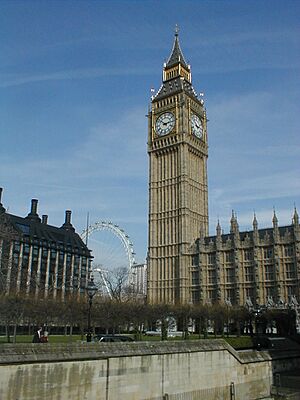
The Parliament of the United Kingdom is located in Westminster, London.
The House of Commons
MPs from England are elected at the same time as MPs from the rest of the UK. There are 533 English voting areas. Because there are so many English MPs, they always form the biggest group in the House of Commons of the United Kingdom.
English Votes for English Laws (EVEL)
The West Lothian Question has been a big issue for many years. It's about MPs from Scotland, Wales, and Northern Ireland being able to vote on laws that only affect England. But these same issues are handled by their own local governments in their own countries.
In May 2015, the Conservative Party promised to change this. They wanted to create an English Grand Committee. This would give English MPs a much bigger say on issues that only affect England (or England and Wales). This idea is called "English Votes for English Laws" (EVEL).
On October 22, 2015, the Conservative government, led by David Cameron, approved these changes. They came into effect right away.
The House of Lords
The House of Lords also has more members from England than from other parts of the UK.
Some members of the House of Lords are called the Lords Spiritual. These are bishops from the Church of England. There can be up to 26 Lords Spiritual in the House of Lords. They always include the five most important leaders of the Church:
- The Archbishop of Canterbury
- The Archbishop of York
- The Bishop of London
- The Bishop of Durham
- The Bishop of Winchester
The other 21 seats are filled by the longest-serving other bishops of the Church of England. So, the Lords Spiritual only represent the Church of England. However, people from other churches and religions can also be appointed to the House of Lords as individuals.
'England Only' Government Departments
Several government departments in the UK are responsible for things that only affect England:
- The Department for Levelling Up, Housing and Communities deals with local councils and housing in England.
- The Department for Education is in charge of education for people in England up to age 19.
- The Department for Environment, Food and Rural Affairs (Defra) protects the natural environment, handles food production, agriculture, and fisheries in England.
- The Department of Health (DoH) makes government rules about health, social care, and the English National Health Service (NHS).
- The Office for Standards in Education, Children's Services and Skills (Ofsted) checks the quality of schools and children's services in England.
Other departments mainly deal with England but also have some responsibilities across the whole UK:
- The Department for Transport
- The Department for Culture, Media and Sport
Devolution within England
Greater London Authority
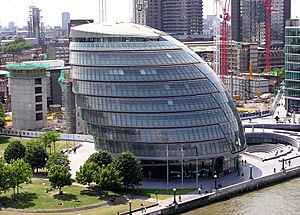
Greater London has its own local government. This includes the London Assembly and a directly elected Mayor of London. The London Assembly was set up in 2000 after people in London voted for it. This happened around the same time as devolution in Scotland and Wales.
In Greater London, the 32 London borough councils manage local services. They work under the Greater London Authority. This Authority handles things like transport, policing, and fire services, which are managed by county councils in other parts of England.
The Mayor of London is sometimes called the "London Mayor." This helps avoid confusion with the Lord Mayor of the City of London, which is an older, mostly ceremonial role for a very small part of central London. The Mayor of London is for the whole of Greater London, which has over 7.5 million people.
Former Regional Assemblies
After Scotland, Northern Ireland, and Wales got their own governments, there were plans to create elected regional assemblies in some parts of England.
The first one was in London in 1998, and it was approved. This led to the creation of the London Assembly and Mayor of London in 2000.
A vote was held in North East England in 2004, but people there voted against having an elected assembly. Because of this, plans for votes in other regions were cancelled. Most of the other regional assemblies were closed down in 2010.
Status of Cornwall
Most people in England and the UK government see Cornwall as a county of England. However, some people who identify as Cornish nationalists believe that Cornwall should have more self-rule.
Groups like Mebyon Kernow, a Cornish nationalist party, want a democratically elected Cornish Assembly. They don't want Cornwall to be part of the South West Regional Assembly with other counties like Devon and Somerset.
English Political Parties
Most political parties that only work in England are focused on English issues. Some examples include:
- The English Democrats Party
- One England
- The English People's Party
- The English Radical Alliance
- The England First Party
- The English Independence Party
The Green Party is separate from the Scottish Green Party. The Wales Green Party is also becoming more independent.
The Conservative Party supports "English Votes on English Legislation" (EVoEL). This policy aims to stop MPs from outside England from voting on laws that only affect England. Some Conservatives also want a full English Parliament and government, similar to Scotland's.
Some English people and parties want to break up the UK entirely. However, the Labour government at the time thought England was too big for one sub-state government. They suggested giving power to different regions within England instead.
Church of England
The Church of England is the official Christian church in England. Queen Elizabeth II is the official head of the church, with the title Supreme Governor of the Church of England. The Archbishop of Canterbury is the main clergyman.
The Church of England's rules say that the Queen is the highest power under God in the kingdom. She has authority over both church and government matters. In reality, this power is often used through Parliament and the Prime Minister.
As mentioned before, 26 of the Church of England's bishops are allowed to sit in the House of Lords. The Archbishops of Canterbury and York, and the Bishops of London, Durham, and Winchester, automatically have seats. The other 21 seats are given to the longest-serving bishops. When a bishop joins the House of Lords, they become a Lord Spiritual.
Status of Monmouthshire
The historic county of Monmouthshire is located on the border between England and Wales. Some English nationalists argue about its status. Although most of the county is now in Wales, a small part called Welsh Bicknor is in England. The border between England and Wales has changed more often than the border with Scotland.
Monmouthshire's status as part of Wales was unclear until recently. It was often thought of as part of England.
In 1535, the Laws in Wales Act made Wales part of the English legal system. Some areas were added to existing English or Welsh counties. Monmouthshire became a new county. It was given two representatives in Parliament, like English counties, not one like Welsh counties. The 1542 Act listed 12 Welsh counties, but it did not include Monmouthshire.
The issue was finally made clear by the Local Government Act 1972. This law said that from April 1, 1974, "Wales" would include the administrative county of Monmouthshire. On April 1, 1996, a local government area called Monmouthshire was created, covering the eastern part of the historic county.
However, some people still debate this. The English Democrats party ran candidates in the 2007 Welsh Assembly elections. They wanted a vote for Monmouthshire to decide if it wanted to be part of Wales or England. They didn't get many votes.
An example of a former Welsh area in England is Welsh Bicknor.
Status of Berwick-upon-Tweed
The status of Berwick-upon-Tweed, which is north of the River Tweed, is also debated. This is especially true among Scottish nationalists. Berwick was its own county until 1885, when it became part of Northumberland for Parliament.
In 2008, a Scottish politician named Christine Grahame suggested that Berwick should become part of Scotland again. She said that even the leader of Berwick-upon-Tweed Borough Council supported the idea.
However, Alan Beith, the MP for Berwick, said it would cause huge legal problems and wasn't realistic. But another politician, Jeremy Purvis, who was born in Berwick, disagreed. He wanted the border to move 20 miles south to include the whole Berwick area. He said that people in Berwick felt that public services were better in Scotland.
According to one TV poll, 60% of people living in Berwick wanted it to rejoin Scotland.
Images for kids
 | Leon Lynch |
 | Milton P. Webster |
 | Ferdinand Smith |


